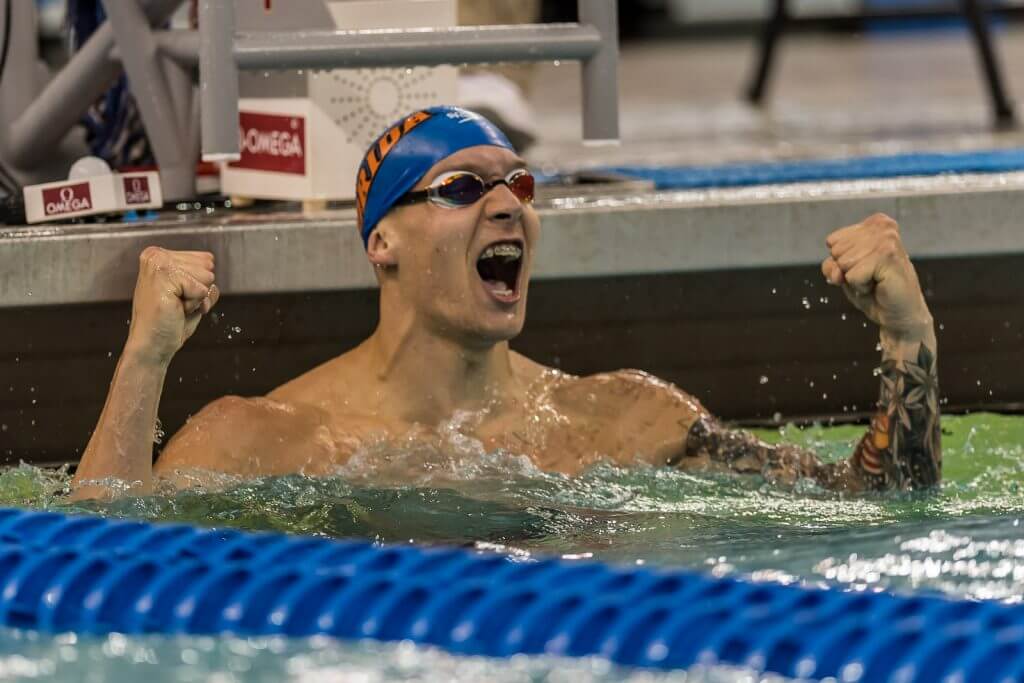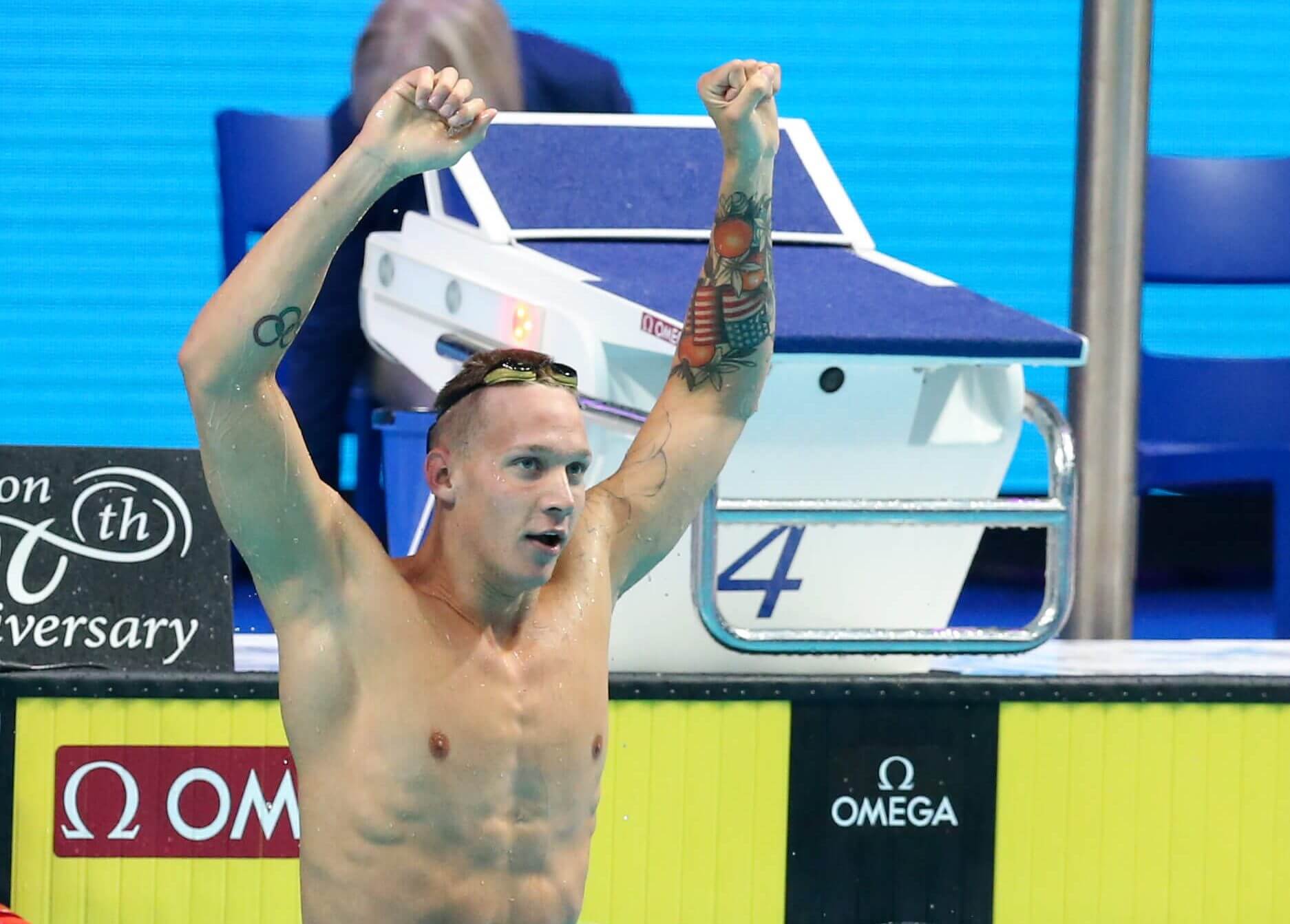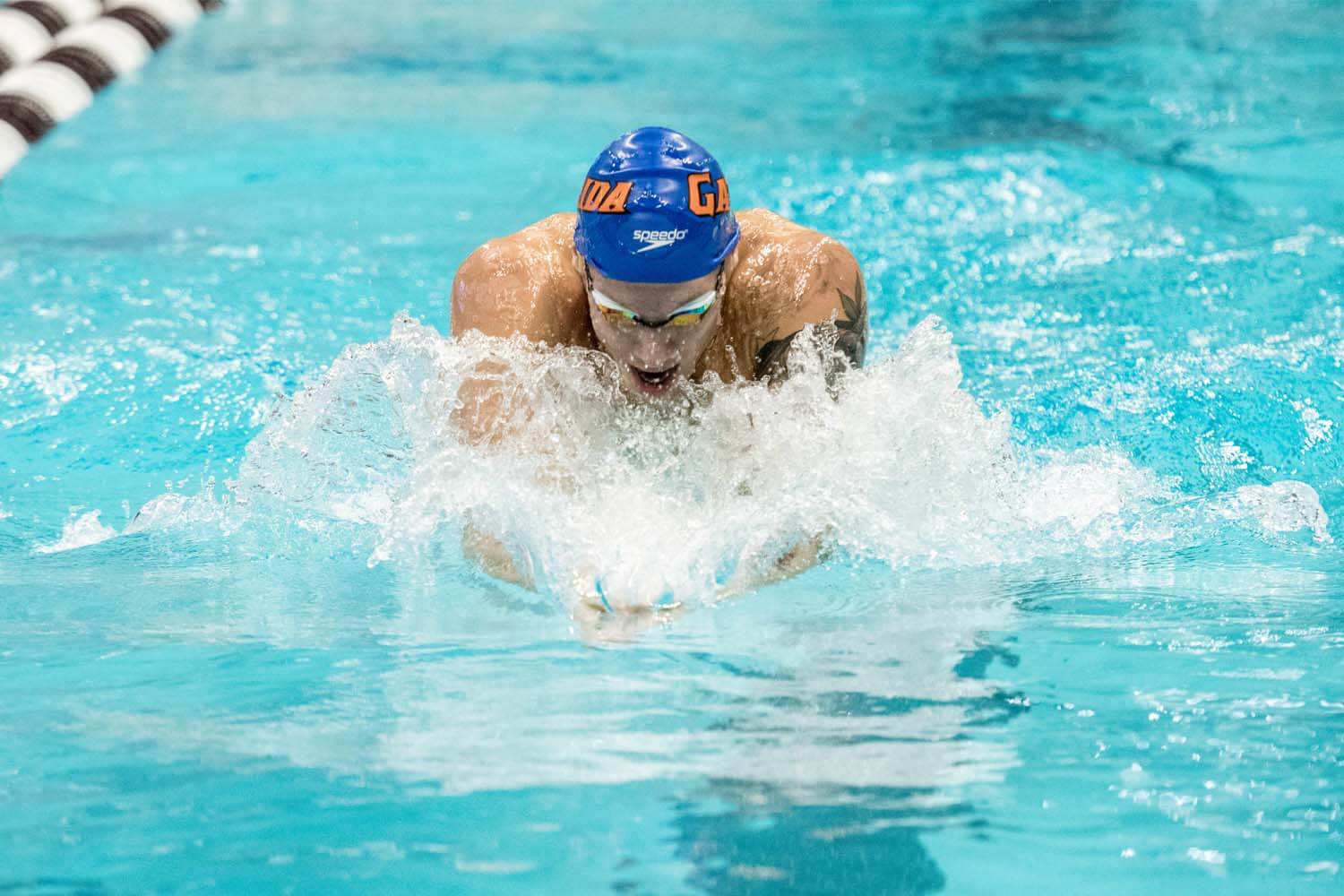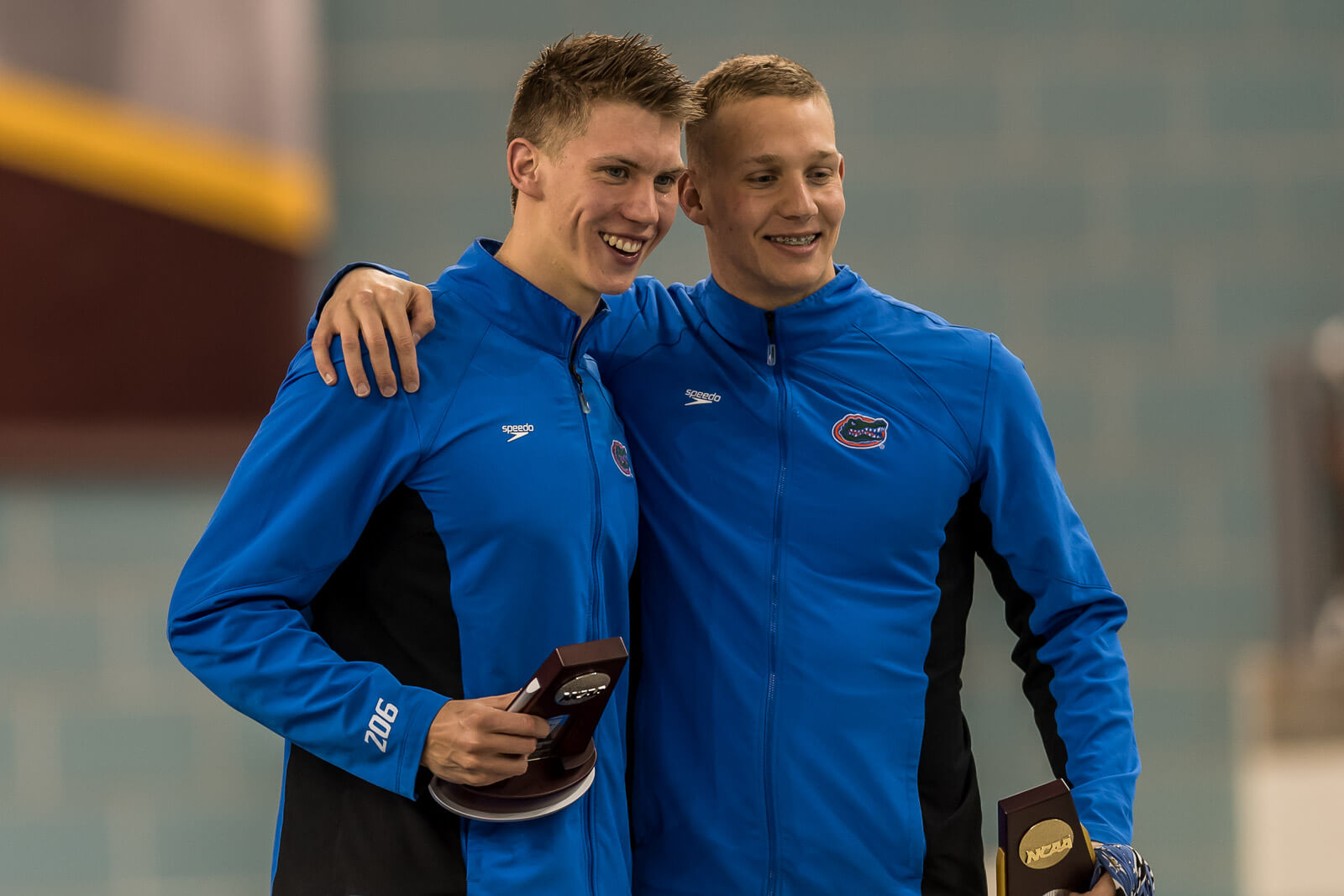Legendary NCAA Career Complete, the Real Test Awaits Caeleb Dressel

Editorial content for the 2018 NCAA DI Championship coverage is sponsored by TritonWear. Visit TritonWear.com for more information on our sponsor. For full Swimming World coverage, check event coverage page.
By David Rieder.
For two years, the NCAA swimming community had already been enthralled with Caeleb Dressel. His sophomore and junior years at Florida, Dressel posted mind-numbing, internet- wrecking records at the SEC and NCAA championships: His 18.20 in the 50-yard free, his 40.46 and then 40.00 in the 100 free and, of course, his 17-second relay splits.
At that point, the rest of the world saw Dressel as a talent, yes, but an unproven one in the only venue that matters past college swimming: long course. At the 2016 Olympics, he had provided a key leg for a Team USA triumph in the 4×100 free relay and then finished sixth in the 100-meter free final, but he was not a superstar at the level of NCAA Caeleb Dressel.
Then came Budapest and the 2017 World Championships—the week where everything changed. On three separate nights, Dressel captivated with world by showing that he could sustain his monumental power over a 50-meter course.

Dressel after winning gold the World Championships — Photo Courtesy: SIPA USA
On the meet’s first night, Dressel led off the U.S. men’s 4×100 free relay in 47.26, instantly making him the seventh-fastest performer of all-time. Four days later, he backed it up and proved he could win one on his own, dominating the 100 free final in 47.17.
And then two days after that, Dressel put together one of the finest days a swimmer has ever seen, winning three gold medals in the 50 free, 100 fly and mixed 4×100 free relay in one session, posting some of the fastest times in history in all three.
He was locked in, the best male swimmer in the world, and everybody watching in Budapest and following the meet around the world knew it.
===
After Budapest, Dressel returned to the University of Florida. There was never any serious discussion of turning pro early, not with only one year of collegiate eligibility remaining, but at that point, what was left for him to accomplish in the yards pool?
At no point heading into or during the season did the Gators appear to have the depth required to win a national championship, and Dressel had already taken the sprint records in short course yards to unfathomable levels. Along with his 40.00 from the 2017 NCAA championships, there was his 43.58 in the 100 fly from that meet and 18.20 in the 50 free from one year earlier.
By the time his conference championship meet rolled around in February, Dressel had the answer: He wanted to be more than just the greatest short course sprinter ever. So he went out and threw down a 1:38.13 in the 200 IM. Before that, only one man had ever broken 1:40, and David Nolan’s best time had been 1:39.38.
That gave Dressel four American and NCAA records, out of 13 events contested in college championships. Two days later, the 21-year-old Floridian added another, swimming a 50.03 in the men’s 100 breast to break Kevin Cordes’ record by one hundredth.

Dressel at the SEC championships — Photo Courtesy: Thomas Campbell/Texas A&M Athletics
That night in College Station, Texas, we wondered: Could Dressel make it a clean sweep of the 100-yard events with the 100 back? (No, he said—he would let high school teammate Ryan Murphy keep that one.) And how about the 200 free? If his 200 IM was that good, one would think he would be able to crush what was then the American record, Townley Haas’ 1:30.46.
But Dressel never got his chance in the 200 free. As was the case in previous years, Florida head coach Gregg Troy had him skip the 4×200 free relay on night one of the NCAA championships. Since he returned to his typical 50 free-100 fly-100 free program for NCAAs, Dressel would swim no race longer than 100 yards all week. That was for the good of the team, and Dressel validated that decision with clutch relay swims over the next three days.
From an individual perspective, what did Dressel have left to prove this week? Barring some stunner, he was a virtual lock to score either 57 or 60 individual points—20 per win in the 50 and 100 free, plus 20 for a win or 17 for a runner-up finish behind Joseph Schooling in the 100 fly.
All that said, even if the outcome of both the 50 and 100 free was still determined, the world still stood up and watched closely when Dressel dove in for both of those events because of the history on the line—could he break 18 seconds in the 50 and could he crack 40 in the 100?
To that first question, the answer was a resounding yes. There was the 17.81 leading off Florida’s 4×50 free relay, and less than an hour after that, a 17.61 in the individual event. Both swims prompted standing ovations.
As it turns out, neither Schooling nor anyone else could give Dressel any sort of challenge in the 100 fly, as he roared to a 42.80, seven tenths under his American record from last season and more than a second and a half ahead of anyone else in the field.
Finally, Dressel won his ninth and final individual NCAA title in the 100 free. Feeling the fatigue of a long meet, he finished only a tenth under his own American and NCAA record, but that was enough. His time was 39.90, under that vaunted 40-second barrier.
“They really like to pack the swims in at this meet, so honestly I was just happy to be under 40,” Dressel said. “It was my 13th swim in three days. I just wanted to get up and test my limits mentally and physically. I knew it was going to hurt really bad, and it did. There’s no shortcuts in this sport, so anyone looking for a shortcut might want to change sports.
Another phenomenal, transcendent week, one which earned Dressel his third straight CSCAA Swimmer of the Meet award. But in the grand scheme of the wider world of international swimming—the one Dressel is preparing to enter full-time—he proved nothing. Everyone already knew how talented he was in the yards pool.
===
Eddie Reese, coach of the wildly successful Texas men’s program that won a fourth consecutive NCAA title this week in Minneapolis, has a way of throwing out wise words when they are least expected. In January, after his Longhorns were beaten handily at Arizona State, his thoughts drifted to, of all people, Dressel.
“When you become a pro, you think that you’re up there and you don’t have to do much to stay there, and that never works unless you’re greatly talented,” Reese said. “Caeleb Dressel came back from Rio, didn’t like the results, and Gregg Troy said he worked harder than anybody could believe the next year, and it paid off.
“The sad part? They all have to keep doing that to get better. Nowadays, with the athletes we get in the sport, their window of opportunity does not stay open long.”

Dressel and teammate Jan Switkowski at the NCAA championships — Photo Courtesy: Peter H. Bick
When Dressel returned from Budapest with the world fully convinced of his greatness, he got back to work. He called the year “the best year of training I ever had in my life,” and he insisted that even after winning seven gold medals, matching a feat only Michael Phelps had ever accomplished, he was still hungry for more.
At the SEC championships, a few hours after his jaw-dropping American record in the 200 IM, Dressel referenced a quote he had inserted into his high school yearbook: “I want to use up all the talent God gave me.” In swimming, he explained, he wants to empty the tank and become the greatest swimmer he can be.
That’s why he would not settle for just being a sprinter, extending his record-holding reign to the 100 breast and 200 IM. It’s why he worked diligently to bring his long course swimming up to par with his short course excellence.
And it’s why, with his college career now ending, he won’t rest on the laurels of his seven World titles from last summer. If he needs any reminder of the what-could-go-wrong, he needs only look at the two men who have ever swum quicker than he has in a textile suit in the 100-meter free: Australians Cameron McEvoy and James Magnussen.
At Australia’s Olympic Trials in 2012, Magnussen put up a 100 free time of 47.10. Four years later, McEvoy swam even quicker at Trials, with a 47.04. But both men went to the Olympic Games, London for Magnussen and Rio for McEvoy, and swam slower. Neither has ever won an individual Olympic gold medal.
To most of the swimming world, for whom yards swimming is relatively meaningless, Dressel could still be a one-hit wonder. It’s possible, after all, that he never comes close to repeating his Budapest times.
Possible—but unlikely. Why? Because Dressel still has that hunger and the spark he needs. After the World Championships, there was no hint of complacency, and he just reinforced that by swimming faster than ever before this week in Minneapolis.
But his chances to prove himself will come on the international stage and in a 50-meter pool: this summer at the Pan Pacific Championships in Tokyo, in 2019 at the World Championships in Gwangju and, of course, at the 2020 Olympics in Tokyo.
“Long course is where the big boys come out to play,” Dressel said. “We had a long course focus this whole year. I’m happy with the short course, but we’re still on track for some good long course swimming.”
Does he maintain his upward trend in the sprint free and fly races and begin taking down world records? Can he add another event in which he’s elite in long course? What can he do in the 200 free to, at the very least, aid the only U.S. relay that did not win gold at the 2017 World Champs?
Dressel will have to prove all this in his professional career, beginning now. It’s time for Caeleb Dressel to empty the tank.
“I feel like I’m just getting started in the sport.”




.jpg)
Yeah who wants to see 45 Long course 100meters free and 48 100meters fly and 19, 50 meters free!?!?!
When it is time for the Olympics which part of the world have the best turns and are the most race hardened? Tip it’s not the USA. Rest of the world swims hard year round and the World Cup series ensures they swimmers have the best turns and under waters and starts because each race means $$$$. For some one like Caeleb he has the potential to set world records in short course meters in the 50 and 100 free, 50 and 100 fly, 50 and 100 breast, 100 and 200 IM races. The tip is to break the record by the smallest amount possible so that you can continue to set more world records! How did the Iron Lady become so great, yeh World Cup for many years.
Caeleb is about to get the close to Phelps endorsement money. Money is not going to be the slightest of problems.
Please explain then why collegiate aged swimmers from all over the world come to the USA for college and collegiate swimming.
Oh yeah, and then go back to the last few Olympics and see who stays underwater the longest and the fastest. RED-WHITE-BLUE.
Can’t wait to watch what he brings to the Olympics in 2020
Yize Meng 原來他還沒有做全職
一邊上大學一邊練
Congratulations to him for a great short course season! Looking forward for the long course.
What a machine. Awesome results.